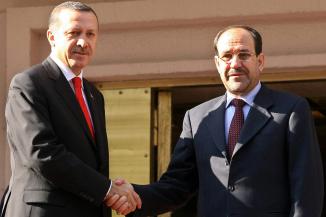 Iraqi Prime Minister al-Maliki and Turkish Prime Minister Erdoğan agreed on Tuesday to joint cooperation between Iraq and Turkey to combat PKK guerrilla activities in northern Iraq. The agreement represents yet another installment of an ongoing saga surrounding the Turkish military's growing frustration with pursuing PKK forces based in northern Iraq.
Iraqi Prime Minister al-Maliki and Turkish Prime Minister Erdoğan agreed on Tuesday to joint cooperation between Iraq and Turkey to combat PKK guerrilla activities in northern Iraq. The agreement represents yet another installment of an ongoing saga surrounding the Turkish military's growing frustration with pursuing PKK forces based in northern Iraq. Over the course of the summer the Turkish military shelled positions inside the Iraqi border, causing a buzz among pundits concerning the possibility of a full-scale invasion. On July 30th, Robert Novak broke the news that the Turkish and the American military were preparing a joint operation meant to suppress PKK guerilla activites in the border areas. The Patriotic Union of Kurdistan's media outlet reported on August 6th that significant numbers of Turkish special forces are currently operating in Iraqi territory.

While Tuesday's agreement does have diplomatic significance for the relations between Iraq and Turkey, it is of little military significance in the eyes of this observer. The Iraqi military is a set of statistics in the minds of Pentagon bureaucracy. Middle East pundits are foolish to think that Iraqi cooperation will somehow improve Turkey's efforts to eradicate the PKK in Iraqi territory.
Moreoever, al-Maliki was not able to actually formalize Tuesday's agreement since he was required to seek approval from his parliament. Even if he does receive such approval, al-Maliki has had little success realizing such divisive initiatives through his country's fractured government. If anything, Tuesday's agreement coupled with the news of American military cooperation has merely paused the discussion in Turkey concerning the possibility of military actions in Iraq.
 Turkey observers should also be cautioned for their tendency to hang onto every word expressed by Turkey's generals concerning an invasion of Iraq. A sustained and full-scale invasion of northern Iraq with its substantial border force would be a very expensive proposition. While Turkish forces would certainly inflict considerable damage on the PKK guerillas, it would seem very unlikely that an invasion would result in their total destruction. As the events of America's war in Iraq have shown, it seems likely that PKK forces would evade Turkish military incursions by slipping into neighboring Syria or Iran. Although these countries are by no means friends of the PKK, they have sporadically used the PKK as a destabilization tool against Turkey for almost two decades.
Turkey observers should also be cautioned for their tendency to hang onto every word expressed by Turkey's generals concerning an invasion of Iraq. A sustained and full-scale invasion of northern Iraq with its substantial border force would be a very expensive proposition. While Turkish forces would certainly inflict considerable damage on the PKK guerillas, it would seem very unlikely that an invasion would result in their total destruction. As the events of America's war in Iraq have shown, it seems likely that PKK forces would evade Turkish military incursions by slipping into neighboring Syria or Iran. Although these countries are by no means friends of the PKK, they have sporadically used the PKK as a destabilization tool against Turkey for almost two decades.
Finally, economic issues related to a Turkish assault on northern Iraq deserve greater consideration in the opinion of this observer. In his article entitled, "PKK Insurgency Grows as AK Party Renews Debate on Cross-Border Operations", Gareth Jenkins of the Jamestown Foundation refers to a series of pieces in the Turkish newspaper, Milliyet, which outline Turkey's growing economic presence in the Kurdish region of Iraq. To compromise the surplus of trade, jobs and investment opportunities that Turkey enjoys in northern Iraq would not appear to be prudent.
In addition, extensive Turkish military activities in the Kurdish areas of Iraq would certainly disrupt the ongoing positive economic trends experienced in the region. The certain cessation of foreign investment in the area governed by the Kurdish Regional Government (KRG), due to Turkish military operations in the region, would give the KRG reason to push for more autonomy and possibly the creation of a new Kurdish state. Such a scenario would certainly cause Ankara greater consternation than the current situation involving pesky PKK guerrillas based in northern Iraq.
No comments:
Post a Comment